Two Truths to Live by
TwoTruthsandaLie杂文随笔

Two Truths and a Lie杂文随笔
Two Truths and a Lie杂文随笔
在一年中某些固定的时候,你发现世界宛如一丛荒草。
你对世人鸡同鸭讲,他们对你驴头马嘴。
所有的一切都是荒芜的,是一个没有解的循环,他们争辩,他们厮杀,他们忏悔,在忏悔声里新的厮杀却早就诞生了。
天空太冷、大地太热,纯真比瓷器还要易碎,而你看着它们淙淙地落进泥土里。
在一年中某些固定的时候,你思考死亡。
她应当是一件意外,一种极端的喜剧和悲剧。
你思考死亡豁免的那些责任,再思考会为此伤心欲绝的人们。
这大概是令人期待的,也是令人悲伤的,但你只想到这个世界,想到它会毫无知觉地从你的身体上碾过去,十年如一日的残暴和扭曲。
于是你感到愤怒。
在一年中某些固定的时候,你陷入一种难以自拔地忧郁和感伤之中。
那可能只是因为你饿了,你困了,或是一种全然随机性的激素失调。
但你感到不明所以的悲伤。
你觉得世界是一条遍受污染的河,价值是宇宙沧海中的`一颗砂砾,而你是一只活的太久的蜉蝣,不渴望闻道而只期待死亡。
活着太孤独了,太绝望了,而死亡像是一种确定的恐怖。
你觉得自己做成了太多的事,你觉得自己一事无成。
你躺在床上,建筑嗡鸣作响的循环系统发出一种温暖的乐声,也让你听到死神的镰刀敲在屋顶上。
Two Truths to Live by
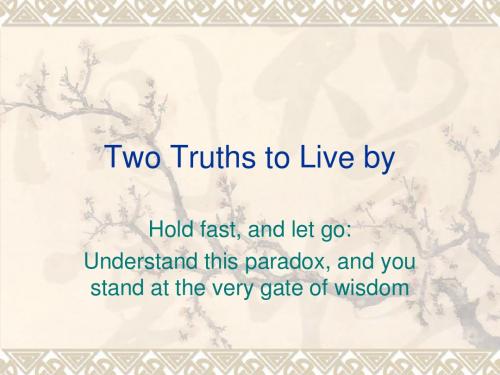
Sentence Patterns
I looked to see whether… (Para. 7) The insight… is as commonplace as was the experience itself: (Para. 8) We must confront…losing ourselves, as it were, all that… (Para. 12) (used when describe sb. or sth. in a way that does not quite exist) He is my best friend, my second half, as it were.
Sentence Patterns
Add
love to a house and you have a home. = If you add love to a house, you will have a home
Words
perish
vi. be destroyed, die Unless the plant get water for its root to absorb, it will perish. George and all his men perished at the battle field. we are trying to make sure that democracy will never perish from this earth.
invest
with vt. to give officially to sb. signs of rank or power The singer invested her songs with a bittersweet sadness. The old ruins were invested with romance. The government invested him with special powers to deal with the situation.
TWO_TRUTHS_TO_LIVE_BY

new words and phrases
1.enjoin
• 禁止 forbid ban inhibit enjoin sb.from doing sth. The judge enjoined him from selling alcohol. • 命令,嘱咐 order to do impose on enjoin sb.to do /sth.on Our boss enjoined us to obey the rules. He enjoined a duty on his assistant.
Translation of long sentences
• 1. (Paragraph1) The art of living is to know when to hold fast and when to let go. For life is a paradox: it enjoins us to cling to its many gifts even while it ordains their eventual relinquishment.
• Tips: nay:adv,否,不;不但如此,而且
• 这是不太容易学到的教训,特别当我们年 轻,以为世界掌握在我们手中,无论我们 满怀激情、全力渴望什么,都能够,不, 都将是我们的。但是后来生活推进,让我 们面对现实,我们渐渐而确定地明白了第 二条真理。
• Rabbi Chanayo Ben Teradyon • When he was burned at the stake ,he replied “I see the parchment burning,but the letters of the law, they soar on high.”
unit6twotruthstoliveby

unit6twotruthstolivebyUnit Six Two Truths to Live By(8 Class Periods)About the authorAlexander M. Schindler(1925-2000 ), President of the Union of American Hebrew Congregation (1973-1996),leader of the reform Movement of American Judaism for more than two decades and a pivotal figure in 20th century Judaism.Rabbi Schindler‘s papers contain contemporary perspectives on many, if not most, of the keys social and cultural issues facing American Jewry and American society from the 1960s to 1990s. This text is an excerpt from his speech at the commencement of the University of South Carolina.Lead-in discussionWhat is your motto in life? Explain it.Do you find life sometimes paradoxical? If yes, please give one exampleDetailed AnalysisPara 1.The theme of the essay is explicitly stated in the first sentence. The author points out that life itself is a paradox. We should cling to its gifts and let go of them in time, which is explained by the rabbi‘s analogy. Paragraphs 2-In these two paragraphs, the author explains one side of the paradox and points out that we often fail to see the beauty and wonder of life when we shoud be holding on to it. As a result it is often too late when we finally realize it.paragraphs 4-7The author relates one event during his hospitalization thatre-teaches him the truth (when and how to hold fast to life) These paragraphs describe the immediate impact of the sunlight on the author as he was wheeled across the courtyard. It suddenly dawned on him how beautiful and precious life was and how indifferent people were to the gift of life.paragraphs 8-9In these short paragraphs the author sums up the truth revealed to him in the event and urges us to hold fast to the gifts of life. (Notice the imperative mood in para. 9)paragraphs 10-11After explaining one side of life‘s paradox— how to hold fast to life, the author directs his discussion to the other side of the paradox– how to let go.paragraphs 12-13The author explains why we must accept losses and learn how to let go: it is the inevitabilities of life that we must endure form birth to death. This truth is revealed by the author through the inevitable losses we suffer at every stage of lifeparagraphs 14-15As a solution to the paradox the author suggests a wider perspective to view what is transient and what is eternal. This perspective enables us to realize that ―our lives are finite‖, but our deeds, beauty and wonder on earth are timelessparagraphs 16-17In these two paragraphs the author, having convinced us about the paradox of life, gives us his advice as to what we should do in order to make our lives meaningful and our deeds ―timeless‖, that is, instead of pursuing perishable objects and material wealth, we should pursue ideals---and add love, righteousness, truth, religion and justice to our materialpossessions.Poem Appreciation: Nothing gold can stayRobert FrostNature?s first green is gold, 大自然的第一抹新绿是金色,Her hardest hue to hold. 也是她最无力保留的颜色.。
《Two Truths to Live by》-backgroud & new words研究生英语课程-犹太教介绍

nay
【n.】 • a negative
But as God is true, our word toward you was not yea and nay.我指著信实的神说:我们向你们所传的道并没有 是而又非的 【adv.】 • not this merely but also; not only so; but Nay, in all these things we are more than conquerors through him that loved us.然而靠著爱我们的主、在这 一切的事上已经得胜有馀了。
demise
【n.】 • transfer of the sovereignty to a successor. Upon his demise,his house passed to his son.他故 世后,房子便传给了儿子。 • death or a cessation of existence or activity. Focus upon death, disease, demise, and you shall live to experience such.聚焦于死亡、疾病、沮丧,而 你会活生生地去体验这些。 【v.】 • to convey by will or lease • to transmit by succession or inheritance • die, decease
cling to
• cling to:hold firmly it enjoins us to cling to many gifts even while it ordains their eventual relinquishment.
• cling together:unite as one We should cling together in times Live by
two truths to live by课文课件

two truths to live by课文课件全文共四篇示例,供读者参考第一篇示例:Two Truths to Live By1. Truth #1: Treat Others as You Would Like to Be TreatedThe golden rule, “treat others as you would like to be treated,” is a fundamental principle that can help us create harmonious relationships with others. When we treat others with kindness, respect, and empathy, we are more likely to receive the same treatment in return. By showing love and compassion to those around us, we can build a strong support system and create a positive environment for ourselves and others.第二篇示例:在我们的日常生活中,有许多值得我们遵循的真理和道理。
在这篇文章中,我们将探讨两个可以帮助我们更好生活的真理。
这两个真理是:诚实和善良。
这两个真理是我们在日常生活中应该遵循的基本原则,并且可以帮助我们建立更加积极、正面的人生态度。
第一个真理是诚实。
诚实是一个人最基本的品质之一,也是构建良好人际关系的基础。
在我们的日常生活中,经常会遇到需要说谎的情况,但是诚实才是我们应该遵循的原则。
只有诚实才能建立信任,而信任是人与人之间互相依赖的基础。
不管是在工作、家庭还是社交圈中,诚实都是至关重要的。
另一个真理是善良。
善良是一个人品德的象征,也是我们应该保持的态度。
6课 two truths to live by
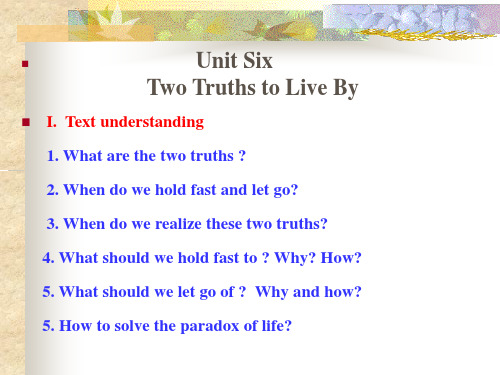
We should hold fast to life and let go of losses we have in life.
When we have what we have, we should
understand it, appreciate, treasure it, cherish it,
make full use of it, knowing our life consists of
o lot of things, such as friendship, love, happiness and sufferings, gains and losses and so on.
6. What is a paradox? A paradox is a figure of speech consisting of a statement or proposition which seems self-contradictory, absurd or contrary to an established fact or practice, but which on further thinking and study, is true, well founded and even to contain a succinct point.
7. text division Divide the text into four parts and write the main idea for each part.
Part One (Para.1 — Para --) Introduction Part Two (Para. Part Three (Para. to Para. ) to Para. )
Two_Truths_to_Live_by(中英对照)

Two Truths to Live byHold fast, and let go: Understand this paradox, and you stand at the very gate of wisdomAlexander M. SchindlerCommencement speech at the University of South Carolina in 1987The art of living is to know when to hold fast and when to let go. For life is a paradox: it enjoins us to cling to its many gifts even while it ordains their eventual relinquishment. The rabbis of old put it this way: “A man comes to this world with his fist clenched, but when he dies, his hand is open.Surely we ought to hold fast to life, for it is wondrous, and full of a beauty that breaks through every pore of God's own earth. We know that this is so, but all too often we recognize this truth only in our backward glance when we remember what it was and then suddenly realize that it is no more.We remember a beauty that faded, a love that waned. But we remember with far greater pain that we did not see that beauty when it flowered, that we failed to respond with love when it was tendered.A recent experience re-taught me this truth. I was hospitalized following a severe heart attack and had been in intensive care for several days. It was not a pleasant place.One morning, I had to have some additional tests. The required machines were located in a building at the opposite end of the hospital, so I had to be wheeled across the courtyard on a gurney.As we emerged from our unit, the sunlight hit me. That's all there was to my experience. Just the light of the sun. And yet how beautiful it was--how warming, how sparkling, how brilliant!I looked to see whether anyone else relished the sun's golden glow, but everyone was hurrying to and fro, most with eyes fixed on the ground. Then I remembered how often I, too, had been indifferent to the grandeur of each day, too preoccupied with petty and sometimes even mean concerns to respond to the splendor of it all.The insight gleaned from that experience is really as commonplace as was the experience itself: life's gifts are precious--but we are too heedless of them.Here then is the first pole of life's paradoxical demands on us: Never too busy for the wonder and the awe of life. Be reverent before each dawning day. Embrace each hour. Seize each golden minute.Hold fast to life...but not so fast that you cannot let go. This is the second side of life's coin, the opposite pole of its paradox: we must accept our losses, and learn how to let go.This is not an easy lesson to learn, especially when we are young and think that the world is ours to command, that whatever we desire with the full force of our passionate being can, nay, will, be ours.But then life moves along to confront us with realities, and slowly but surely this second truth dawns upon us.At every stage of life we sustain losses--and grow in the process .We begin our independent lives only when we emerge from the womb and lose its protective shelter.We enter a progression of schools, then we leave our mothers and fathers and our childhood homes. We get married and have children and then have to let them go. We confront the death of our parents and our spouses. We face the gradual or not sogradual waning of our own strength.And ultimately, as the parable of the open and closed hand suggests, we must confront the inevitability of our own demise, losing ourselves, as it were, all that we were or dreamed to be.But why should we be reconciled to life's contradictory demands Why fashion things of beauty when beauty is evanescent Why give our heart in love when those we love will ultimately be torn from our graspIn order to resolve this paradox, we must seek a wider perspective, viewing our lives as through windows that open on eternity. Once we do that, we realize that though our lives are finite, our deeds on earth weave a timeless pattern.Life is never just being. It is a becoming, a relentless flowing on. Our parents live on through us, and we will live on through our children. The institutions we build endure, and we will endure through them. The beauty we fashion cannot be dimmed by death.Our flesh may perish, our hands will wither, but that which they create in beauty and goodness and truth lives on for all time to come. Don't spend and waste your lives accumulating objects that will only turn to dust and ashes. Pursue not so much the material as the ideal, for ideals alone invest life with meaning and are of enduring worth.Add love to a house and you have a home. Add righteousness to a city and you have a community.Add truth to a pile of red brick and you have a school. Add religion to the humblest of edifices and you have a sanctuary. Add justice to the far-flung round of humanendeavor and you have civilization.Put them all together, exalt them above their present imperfections, add to them the vision of humankind redeemed, forever free of need and strife and you have a future lighted with the radiant colors of hope.人生的两条真理抓紧与放松:理解了这一悖论,你便立于智慧之门亚历山大·辛德勒1987年在南卡罗来那大学毕业典礼上的演讲生活的艺术就是要懂得适时地收与放,因为生活本身即是一种悖论:一方面,它让我们依恋于它所赋予的各种馈赠;另一方面,又注定了我们对这些礼物最终的弃绝。
UNIT2TWOTRUTHSTOLIVEBY

PartII(Par.2-14) There’re detailed interpretations of the life’s paradox in the light of the parable, religion and other allusions. But in the daily life, people are so indifferent to God’s endowments and so reluctant to accept losses.
our flesh perishes like fallen leaves
Wealth & fame is gone with the wind.
nothing left Don’t be sad, because life is a process.
only ashes
What’s the significance of life? Yesterday’s rose perishes, what we hold is its empty name. Our flesh perishes, but what we have achieved will pass down
Unit 6 Two Truth to Live By
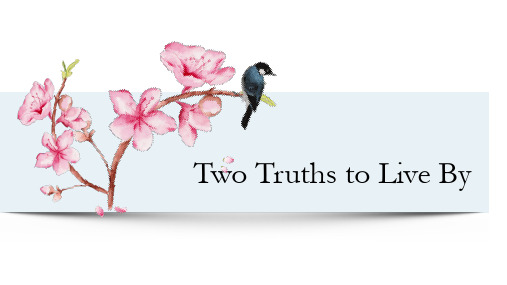
The insight gleaned from that experience is really as
commonplace as was the experience itself…
to and fro para. 6 moving from one place to another and back again, from place to place 来回地,往复地
The boss paced to and fro in the office, uncertain what to do.
dies, his hand is open.
(para. 1)
I looked to see whether anyone else relished the sun’s golden
glow, but everyone was hurrying to and fro, most with eyes
hold fast to para. 1 follow exactly or remain loyal to 坚持,信守,忠于
He holds fast to a simple life after retirement.
他在任何争论中总能坚持自己的观点。
He can hold fast to his own viewpoint in any argument.
其结构为: (with)名词/名词短语/代词+不定式/ing分词/ed分词/adj. /adv./prep
1)表示时间
Her work done, she sat down for a cup of tea. 2) 表示条件 The condition being favorable, he may succeed. 3)表示原因 There being no taxis, we had to walk. 4)表示伴随情况 Almost all metals are good conductors, silver being the best of all.
Two_Truths_to_Live_by(中英对照)
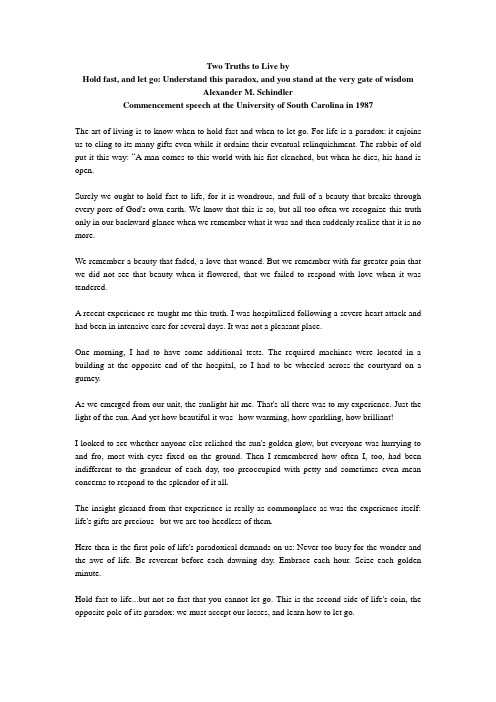
Two Truths to Live byHold fast, and let go: Understand this paradox, and you stand at the very gate of wisdomAlexander M. SchindlerCommencement speech at the University of South Carolina in 1987The art of living is to know when to hold fast and when to let go. For life is a paradox: it enjoins us to cling to its many gifts even while it ordains their eventual relinquishment. The rabbis of old put it this way: “A man comes to this world with his fist clenched, but when he dies, his hand is open.Surely we ought to hold fast to life, for it is wondrous, and full of a beauty that breaks through every pore of God's own earth. We know that this is so, but all too often we recognize this truth only in our backward glance when we remember what it was and then suddenly realize that it is no more.We remember a beauty that faded, a love that waned. But we remember with far greater pain that we did not see that beauty when it flowered, that we failed to respond with love when it was tendered.A recent experience re-taught me this truth. I was hospitalized following a severe heart attack and had been in intensive care for several days. It was not a pleasant place.One morning, I had to have some additional tests. The required machines were located in a building at the opposite end of the hospital, so I had to be wheeled across the courtyard on a gurney.As we emerged from our unit, the sunlight hit me. That's all there was to my experience. Just the light of the sun. And yet how beautiful it was--how warming, how sparkling, how brilliant!I looked to see whether anyone else relished the sun's golden glow, but everyone was hurrying to and fro, most with eyes fixed on the ground. Then I remembered how often I, too, had been indifferent to the grandeur of each day, too preoccupied with petty and sometimes even mean concerns to respond to the splendor of it all.The insight gleaned from that experience is really as commonplace as was the experience itself: life's gifts are precious--but we are too heedless of them.Here then is the first pole of life's paradoxical demands on us: Never too busy for the wonder and the awe of life. Be reverent before each dawning day. Embrace each hour. Seize each golden minute.Hold fast to life...but not so fast that you cannot let go. This is the second side of life's coin, the opposite pole of its paradox: we must accept our losses, and learn how to let go.This is not an easy lesson to learn, especially when we are young and think that the world is ours to command, that whatever we desire with the full force of our passionate being can, nay, will, be ours.But then life moves along to confront us with realities, and slowly but surely this second truth dawns upon us.At every stage of life we sustain losses--and grow in the process .We begin our independent lives only when we emerge from the womb and lose its protective shelter.We enter a progression of schools, then we leave our mothers and fathers and our childhood homes. We get married and have children and then have to let them go. We confront the death of our parents and our spouses. We face the gradual or not so gradual waning of our own strength.And ultimately, as the parable of the open and closed hand suggests, we must confront the inevitability of our own demise, losing ourselves, as it were, all that we were or dreamed to be.But why should we be reconciled to life's contradictory demands? Why fashion things of beauty when beauty is evanescent? Why give our heart in love when those we love will ultimately be torn from our grasp?In order to resolve this paradox, we must seek a wider perspective, viewing our lives as through windows that open on eternity. Once we do that, we realize that though our lives are finite, our deeds on earth weave a timeless pattern.Life is never just being. It is a becoming, a relentless flowing on. Our parents live on through us, and we will live on through our children. The institutions we build endure, and we will endure through them. The beauty we fashion cannot be dimmed by death.Our flesh may perish, our hands will wither, but that which they create in beauty and goodness and truth lives on for all time to come. Don't spend and waste your lives accumulating objects that will only turn to dust and ashes. Pursue not so much the material as the ideal, for ideals alone invest life with meaning and are of enduring worth.Add love to a house and you have a home. Add righteousness to a city and you have a community. Add truth to a pile of red brick and you have a school. Add religion to the humblest of edifices and you have a sanctuary. Add justice to the far-flung round of human endeavor and you have civilization.Put them all together, exalt them above their present imperfections, add to them the vision of humankind redeemed, forever free of need and strife and you have a future lighted with the radiant colors of hope.人生的两条真理抓紧与放松:理解了这一悖论,你便立于智慧之门亚历山大·辛德勒1987年在南卡罗来那大学毕业典礼上的演讲生活的艺术就是要懂得适时地收与放,因为生活本身即是一种悖论:一方面,它让我们依恋于它所赋予的各种馈赠;另一方面,又注定了我们对这些礼物最终的弃绝。
高级英语课后答案(期末考试总复习)

高级英语课后答案(期末考试总复习)Unit 1 A Class Act2. Fill in the blanks with the appropriate forms of the given words.1). Johnny is so ingenious (ingenuity) —he can make the most remarkable sculptures from the most ordinary materials.2). So what is his prescription (prescribe) for success?3). I cannot allow any relaxation (relax) of the rules.4). All pupils are expected to attend the school assembly (assemble).5). She has the most adorable (adore) two-year-old daughter.6). To the mortification (mortify) of the show’s organizers, t he top performers withdrew at the last minute.7). She was wearing a black suit trimmed (trim) with white.8). I didn’t know what to say — I just offered a few words of consolation (console).9). I didn’t want to lose my composure (compose) in front of her.10). She looked a bit dejected (dejection) when she was told that she hadn’t got the job.3. Fill in the blank(s) in each sentence with a phrase taken from the box in its appropriate form.drag into | speak up for | rife with | of one’s own accordration out | single out | trudge through | beside oneselfin place | on the warpath | see through | comply with1). The office was rife with rumors.2). Ann rationed out the cake between the children.3). The arrangements are all in place for the concert next Thursday.4). There are serious penalties for failure to comply with the regulations.5). The course would take me three years to complete, but I was determined to see it through.6). She has often spoken up for the rights of working mothers.7). If there was one thing she couldn’t face in the morning it was her mother on the warpath.8). He was beside himself with grief when she died.9). Don’t drag me into your a rgument! It has nothing to do with me.10). I spent the whole weekend trudging through this report, and I still haven’t finished reading it.11). She came of her own accord. No one asked her to come.12). It’s not fair the way my sister is always singled o ut for special treatment.IV. Translation1).这家公司是由几名有事业心的年轻人创立的。
Unit 10 Two truths to live by
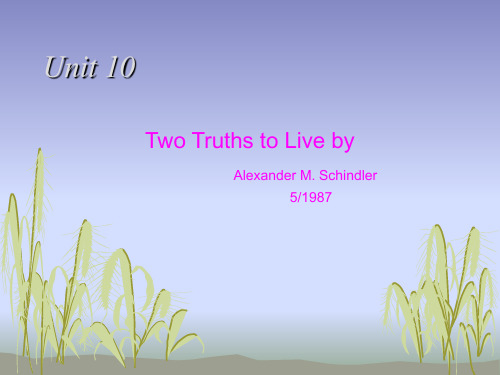
Unit 10
Two Truths to Live by
Alexander M. Schindler 5/1987
The author
Distinguishing synonyms: relinquish
• Relinquish; abdicate; cede; renounce • Relinquish: most general and neutral; release of one’s grasp; letting go of direction/possession (either willingly or with reluctance) (My parents relinquished control over me) • Cede: giving up (usually) by legal transfer or as the result of a treaty (most often indicating the concession of territory)
Difficult and beautiful language
• Vocabulary
• The rabbis of old: • the rabbis in ancient times
• • • • • Hold fast Let go Enjoin Ordain relinquishment
>> 0 >> 1 >> 2 >> 3 >> 4 >>
Two Truths to Live by参考译文
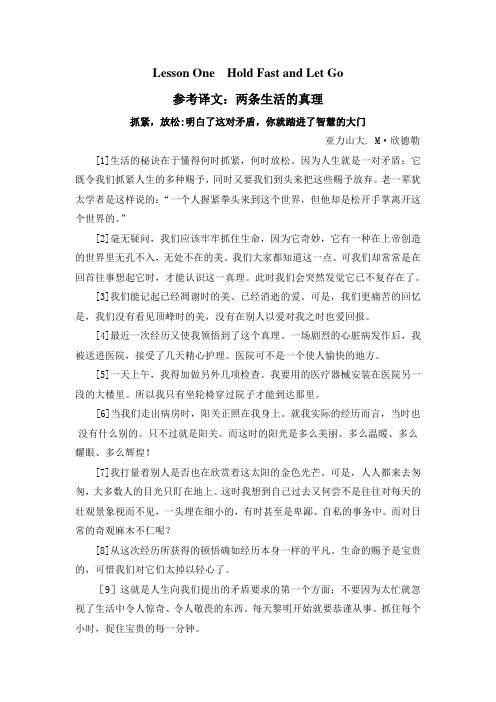
Lesson One Hold Fast and Let Go参考译文:两条生活的真理抓紧,放松:明白了这对矛盾,你就踏进了智慧的大门亚力山大. M·欣德勒[1]生活的秘诀在于懂得何时抓紧,何时放松。
因为人生就是一对矛盾:它既令我们抓紧人生的多种赐予,同时又要我们到头来把这些赐予放弃。
老一辈犹太学者是这样说的:“一个人握紧拳头来到这个世界,但他却是松开手掌离开这个世界的。
”[2]毫无疑问,我们应该牢牢抓住生命,因为它奇妙,它有一种在上帝创造的世界里无孔不入,无处不在的美。
我们大家都知道这一点。
可我们却常常是在回首往事想起它时,才能认识这一真理。
此时我们会突然发觉它已不复存在了。
[3]我们能记起已经凋谢时的美、已经消逝的爱。
可是,我们更痛苦的回忆是,我们没有看见顶峰时的美,没有在别人以爱对我之时也爱回报。
[4]最近一次经历又使我领悟到了这个真理。
一场剧烈的心脏病发作后,我被送进医院,接受了几天精心护理。
医院可不是一个使人愉快的地方。
[5]一天上午,我得加做另外几项检查。
我要用的医疗器械安装在医院另一段的大楼里。
所以我只有坐轮椅穿过院子才能到达那里。
[6]当我们走出病房时,阳关正照在我身上。
就我实际的经历而言,当时也没有什么别的。
只不过就是阳关。
而这时的阳光是多么美丽、多么温暖、多么耀眼、多么辉煌![7]我打量着别人是否也在欣赏着这太阳的金色光芒。
可是,人人都来去匆匆,大多数人的目光只盯在地上。
这时我想到自己过去又何尝不是往往对每天的壮观景象视而不见,一头埋在细小的,有时甚至是卑鄙、自私的事务中。
而对日常的奇观麻木不仁呢?[8]从这次经历所获得的顿悟确如经历本身一样的平凡。
生命的赐予是宝贵的,可惜我们对它们太掉以轻心了。
[9]这就是人生向我们提出的矛盾要求的第一个方面:不要因为太忙就忽视了生活中令人惊奇、令人敬畏的东西。
每天黎明开始就要恭谨从事。
抓住每个小时,捉住宝贵的每一分钟。
[10]紧紧抓住生活——可不要紧得使你不能松手。
英语临床夏季课件unittwotruthstoliveby
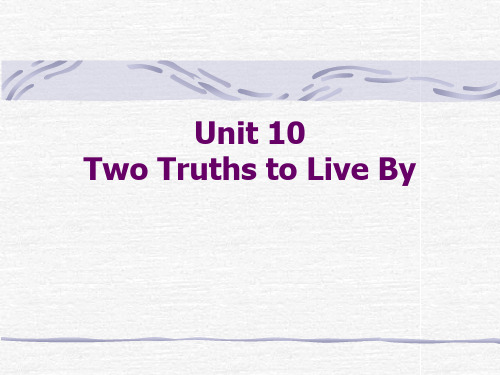
enjoin
The proposed law enjoins employers to
give workers time off to care for sick children and ageing parents.
He enjoined caution about believing
what they told us.
3) "... a beauty '" a love ..." (Paragraph 3) - Be ω ty and love are uncountable nouns,
but here the author uses an indefinite article "a" to suggest a particular event or thing that represents or renders beauty or love.
The author intends to use the metaphor to illustrate the paradox. "A man comes to this world with his fist clenched" means that a man holds fast to the gift of life when he is born, but when he leaves this world, he has to let go of it.
1) "that breaks through every pore of the earth" (Paragraph 2)-- that emerges every-
where on the earth.
新世纪高等院校英语专业综合教程Unit 8 Two truths to live by课文翻译
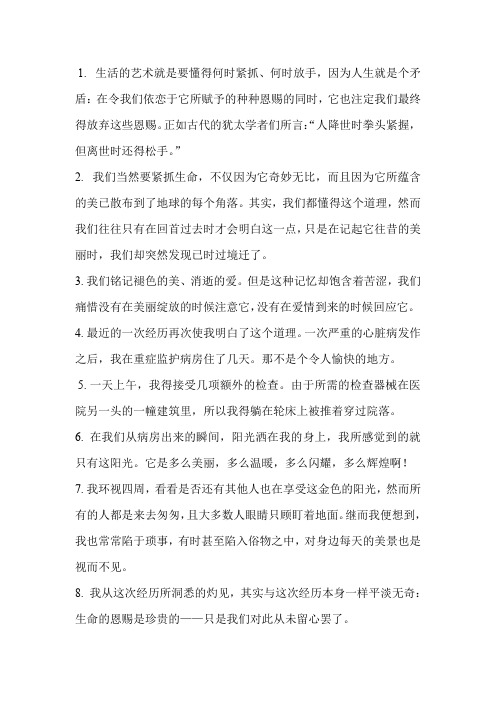
1. 生活的艺术就是要懂得何时紧抓、何时放手,因为人生就是个矛盾:在令我们依恋于它所赋予的种种恩赐的同时,它也注定我们最终得放弃这些恩赐。
正如古代的犹太学者们所言:“人降世时拳头紧握,但离世时还得松手。
”2. 我们当然要紧抓生命,不仅因为它奇妙无比,而且因为它所蕴含的美已散布到了地球的每个角落。
其实,我们都懂得这个道理,然而我们往往只有在回首过去时才会明白这一点,只是在记起它往昔的美丽时,我们却突然发现已时过境迁了。
3. 我们铭记褪色的美、消逝的爱。
但是这种记忆却饱含着苦涩,我们痛惜没有在美丽绽放的时候注意它,没有在爱情到来的时候回应它。
4. 最近的一次经历再次使我明白了这个道理。
一次严重的心脏病发作之后,我在重症监护病房住了几天。
那不是个令人愉快的地方。
5. 一天上午,我得接受几项额外的检查。
由于所需的检查器械在医院另一头的一幢建筑里,所以我得躺在轮床上被推着穿过院落。
6. 在我们从病房出来的瞬间,阳光洒在我的身上,我所感觉到的就只有这阳光。
它是多么美丽,多么温暖,多么闪耀,多么辉煌啊!7. 我环视四周,看看是否还有其他人也在享受这金色的阳光,然而所有的人都是来去匆匆,且大多数人眼睛只顾盯着地面。
继而我便想到,我也常常陷于琐事,有时甚至陷入俗物之中,对身边每天的美景也是视而不见。
8. 我从这次经历所洞悉的灼见,其实与这次经历本身一样平淡无奇:生命的恩赐是珍贵的——只是我们对此从未留心罢了。
9. 因此,对我们有着自相矛盾的要求的人生一方面要求我们:不要过于忙碌而错失生活中的美好和庄严; 虔诚地迎接每个黎明的到来;拥抱每一个时辰,抓住珍贵的每一分钟。
10. 紧紧把握人生……但又不能抓得过死,松不开手。
这是人生这枚硬币的另一面,也正是其矛盾的另一面:我们必须接受失去的现实,学会如何放手。
11. 要学会这点并非易事。
尤其当我们年轻时,以为世界在我们的掌控之中,但凡激情满怀的我们一心想得到的东西,都将属于我们。
上外课件:Unit 10_A (第六册,英语综合教程,外教社)

Text Explanation Part I
1
About the Author
Alexander M. Schindler(1925-2000), Chairman of the Union of American Hebrew Congregations(1973-1996), leader of the Reform Movement of American Judaism for more than two decades and a pivotal figure in 20th century Judaism. This text is an excerpt from his speech at the commencement of the University of South Carolina.
国的司法权属於一个最高法院以及由国会随时下 令设立的低级法院。
• Is it ordained in heaven that women shall work in the home? • 女人就该在家里干活儿,这是上天的旨意吗?
8
relinquishment
• 1. a verbal act of renouncing a claim or right or position etc.2. the act of giving up and abandoning a struggle or task etc. • British relinquishment of power in India was accompanied by the partition of the country;英国对在印观, 同时保护和保卫美国人民。 • Hold fast to life,but not so fast that you cannot let go.牢牢抓住生活,可不要抓太紧以至于无 法放弃。
研究生英语精读教程教师参考书(第三版上)-参考答案及授课详解

研究生英语系列教材研究生英语精读教程教师参考书(第三版·上)ContentsUnit OneText: You Are What You Think (1)Supplementary Reading (10)Unit TwoText: Cancer & Chemicals (11)Supplementary Reading (18)Unit ThreeText: Rats and Men (19)Supplementary Reading (27)Unit FourText: Einstein’s Painful Romance (29)Supplementary Reading (35)Unit FiveText: The End Is Not at Hand (37)Supplementary Reading (44)Unit SixText: Two Truths to Live By (47)Supplementary Reading (58)Mini-Test Ⅰ (59)Unit SevenText: Good Taste, Bad Taste (61)研究生英语精读教程教师参考书(第三版/上)Supplementary Reading (70)Unit EightText: I Have a Dream (73)Supplementary Reading (80)Unit NineText: This Was My Mother (81)Supplementary Reading (91)Unit TenText: Digital Revolution: How the Korean Group Becamea Global Champion (93)SupplementaryReading (100)Unit ElevenText: In Search of the Real Google (101)Supplementary Reading (118)Unit TwelveText: A Red Light for Scofflaws (119)Supplementary Reading (129)Mini-Test Ⅱ (131)►Text:You Are What You ThinkClaipe SafranLanguage Points1. Para. [2]: mental illsWhen used as a noun, “ill” means “anything causing harm, trouble,wrong,un happiness, etc., specifically: a) an evil or misfortune; b) a disease”.Its synonyms in this lesson: disease (Para.10), ailments(Para.11), illness (Para.11)Other synonyms: sickness, ailing, infirmity, indisposition, complaint, disorder, malady, distemper2. Para. [7]: When they failed on the first call or two ...When the first few people they phoned refused to donate blood ...3. Para. [8]: self-fulfilling prophecya prediction brought to fulfilment chiefly as an effect of having been expected or predicted4. Para. [9]: A sense of control ... is the litmus test for success.Whether one feels in control of the situation will determine if one succeedsin the end.5. Para. [10]: ... think they are better than the facts would justify ...overestimate themselves; regard themselves as better than they really are 6. Para. [13]: at one’s m other’s kneewhen one is a small child研究生英语精读教程教师参考书(第三版/上)Word Study1. donate v.donation n.donator n.①He donated all his savings to the village school.②They have donated to the Red Cross.③The van was donated to us by a local firm.④The new library has received a generous donation of 200 rare books from its favourite patron.⑤He made a donation of $1,000 to the children’s hospital.⑥The Famine Relief Fund has received 500 yuan in cash from an anonymous donator.2. recur v.recurring adj.recurrent adj.recurrence n.①He is more concerned about those problems which recur periodically.②If you divide 10 by 3, the result will be a recurring decimal.③Lack of confidence in himself will be a recurring problem for him in the future.④The patient complained of a recurrent headache.⑤He was aware of the possibility of recurrence of his illness.⑥His words of encouragement recurred to my mind whenever I was in low spirits.3. immune (to/against/from) adj.immunity n.immunize v.immunology n. study of resistance to infection①He seems to be immune to flattery.②We are immune from smallpox as the result of vaccination.③The child has received immunity to a variety of infections.Unit One④He was given immunity from taxation on the ground that he had been seriously injured.⑤Ambassadors enjoy diplomatic immunity in the countries in which they are stationed.⑥Everyone who is going abroad will need to be immunized againsttyphoid.⑦The government is going to spend more money on its immunizationprogram.⑧He has devoted all his life to immunology.4. caution n. & v.cautious adj.①You must exercise extreme caution when you cross this street.②The police gave him a caution for speeding.③The policeman cautioned the motorist about his speed.④They cautioned him about danger.⑤His teacher cautioned him that he might fail his exam.⑥If I had been less cautious, I might have made greater progress.⑦They are very cautious of/about giving offence.⑧He walked cautiously in this unknown territory.5. triumph n. & v.triumphant adj.①The conquest of outer space is one of the greatest triumphs of modernscience.②His life was a triumph over ill health.③Though he had beaten his opponent in the election, they could detect notriumph in his eye.④Grinning broadly, he held up the prize in triumph.⑤Justice triumphs in the end.⑥He triumphed over many difficulties.⑦Her triumphant smile told me how proud she was of her success.⑧Having succeeded at his first attempt, the boy looked at me triumphantly.研究生英语精读教程教师参考书(第三版/上)参考译文你认为自己是什么样的人,那你就是什么样的人如果你改变想法——从悲观变为乐观——你就可以改变自己的生活卡勒普·撒弗兰[1] 你看酒杯是半杯有酒而不是半杯空着的吗?你的眼睛是盯着炸面圈,而不是它中间的孔吗? 当研究者们仔细观察积极思维的作用时,这些陈词滥调突然间都成了科学问题。
- 1、下载文档前请自行甄别文档内容的完整性,平台不提供额外的编辑、内容补充、找答案等附加服务。
- 2、"仅部分预览"的文档,不可在线预览部分如存在完整性等问题,可反馈申请退款(可完整预览的文档不适用该条件!)。
- 3、如文档侵犯您的权益,请联系客服反馈,我们会尽快为您处理(人工客服工作时间:9:00-18:30)。
Two Truths to Live by Language Point
Para 1
1.a rt: method, facility; liberal art, humanities He is good at the art of making friends.
He received his master’s degree of art.
2.F or life is a paradox: life is self-contradictory.
3.I t enjoins us to cling to its many gifts even while it ordains their eventual relinquishment.
While: although (conj) introducing an adverbial clause of concession.
Enjoin: direct, instruct
Relinquish: let go of
Edward III relinquished his throne to marry Mrs. Simpson.
Lucy has relinquished all hope of going to Europe this year.
Ordain: destine
4.t he rabbis of the old: the spiritual leaders of Jewish congregation in the past
5.p ut it this way: express it in words this way
para 2
1.b reak through; to be successful after
2.a ll too often: more often than is desired
During foggy weather the train are all too often late.
/
Para 3
1.f lower: flourish
2.t ender: offer, give
He tendered what he could to the association.
Para 5
Be wheeled on a gurney: be moved or pushed along with a Forney
Para 6
That’s all: there is no alternative; that is all that can be done
Para 7
1.r elish: enjoy thoroughly; appreciate
I relish a good song as much as anyone else.
I do not relish my food as I used to.
I do not relish the idea of a battle in that icy water.
2.t o and fro: here and there
3.b e preoccupied with: be engaged in
When Tom ia preoccupied with his computer programming, he has no idea of what is going on around him.
I was too preoccupied to hear the bell.
4.s plender: excellent or grand beauty
5.t he splendor of it all: all of the splendor Para 8
Glean: to gather
Para 9
1.H ere is the first pole of life’s paradoxical demand on us.
---Here is the one side of self-contradictory demands life makes on us.
2.a we: a feeling of respect mixed with fear and wonder.
Para 11
1.d awn upon: to become suddenly clear to someone
It dawned on them that might be cut off by the tide which destroyed the railway line. 2.n ay: not only so but also (old use, formal) All of us are willing, nay, eager to go to Beijing for a visit.
Para 12
1.s ustain: suffer, undergo; keep up, maintain She sustained a great loss in the death of her husband.
This book can sustain comparison with other classics.
A light meal will not sustain us through the day.
2.…our own demise, losing ourselves as it were
“losing ourselves”is the apposition of “demise’.
Para 13
1.r econcile to: to have to accept something unpleasant
He reconciled himself cheerfully to a modest livelihood in a small country town.
2.W hy fashion things of beauty when beauty is evanescent?
Why make beautiful things when beauty is soon disappearing?
Para 15
1.i nstitution:
a.custom, established practice, convention
b.c ompany, organization, association,
college
c.the act of instituting
para 16
1.i nvest with: clothe; endow; decorate; surround (with qualities)
The singer invested her songs with a bittersweet sadness.
The old ruins were invested with romance.
The government invested him with special powers to deal with the situation.
Para 17
Add love to a house and you have a home.
----- If you add love to a house, you will have a home.。
